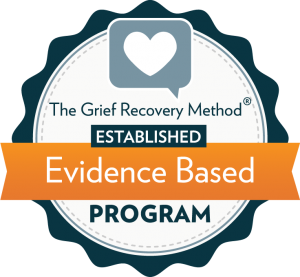Is the Grief Recovery Method® proven to work?
“The Grief Recovery Method® (GRM) program is an evidence-informed, practice-based program that has been shown to effectively influence components of grief and grief recovery.”
Here are some helpful definitions:
• Evidence-informed – the GRM program combines person-centered values with several evidence-based practices that are supported by educational research and have been shown to be effective. These evidence-based practices are grounded in behavioral theory, group cohesiveness, meaning-making, and prolonged exposure therapy.
• Practice-based: The GRM program was exclusively developed by grievers FOR grievers based on over 40 years of firsthand experience. The program has been implemented across the globe in 22 unique countries and translated in more than 15 different languages.
• Evidence-based: The GRM program has been shown to effectively influence components of grief and grief recovery through data that has been collected and analyzed from phases 1-3 of the program research project. The components of grief and grief recovery that the program has been shown to effectively influence are grievers’ knowledge, attitudes, beliefs, and behaviors of grief recovery.
• Longitudinal: A research study where people who have completed the GRM program are followed over a period of time.
How Does the GRM Program Work?
Based on over 40 years of practice dealing with grief and working one on one with grievers, the GRM program helps reduce grief by teaching grievers new skills on how to cope and process grief (knowledge); how to confront old myths or unhelpful patterns of grieving (attitudes); how to examine the ways in which grief has impacted their life through detailed assignments and exercises (beliefs); and how to let go of pain from loss through the timely identification of apologies, forgiveness, and significant emotional statements, all within a helpful, supportive environment (behaviors of grief recovery).
What Research has been Conducted on the GRM Program?
At present, research has only been conducted on the 8-week format of the GRM program. Using this 8-week format, research phases 1-2, and only the first half of phase 3 have been completed.
- Phase 1 (completed) – A tool was developed to measure grievers’ knowledge, attitudes, beliefs, and behaviors of grief recovery.
- Phase 2 AND the first half of Phase 3 (completed) – The tool from phase 1 was used to measure grievers’ knowledge, attitudes, beliefs, and behaviors of grief recovery before (pre) AND after (post) they received the GRM program. From this study, we were able to establish evidence on how the program works (i.e. the program effectively influences components of grief and grief recovery identified as grievers’ knowledge, attitudes, beliefs, and behaviors of grief recovery).
- Second half of phase 3 (incomplete) – The second half of phase 3 remains to be completed because it requires a large amount of funding ($75-$100k), which has not yet been acquired. This funding, once received, will be used to conduct the remaining part of phase 3, which arguably is the most important part, and consists of a national, longitudinal program evaluation study on the 8-week GRM program.
In this longitudinal study, we will invite a national sample of grievers to participate in the study and complete the program. After they complete the program, we hope to follow-up with the participants at 6-months and again at 12-months to learn how the program has helped them reduce their grief with the passing of time.
References
1. Nolan R, Hallam J. The Grief Recovery Method® Instrument: Development and validation for construct validity of the treatment [dissertation]. Kent: Kent State University; 2018. Publicly available online at Google Scholar or if you have institutional access, please visit https://www.ohiolink.edu/.
2. Nolan R, Hallam J. Measurement development and validation for construct validity of the treatment: The Grief Recovery Method® Instrument (GRM-I). Manuscript submitted for peer-review. 2018.
3. Nolan R, Hallam J. Development and validation of the John James and Russell Friedman Theory of Grief Recovery (TOGR): A new paradigm towards our understanding of grief and loss. Manuscript submitted for peer-review. 2018.
